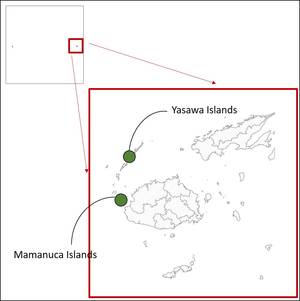Fiji
Fiji is a large archipelago with diverse landscapes and climate. More than 332 islands are scattered over 1.3 million square kilometres of the South Pacific Ocean. With around 60 percent of Fiji’s land area consisting of forest cover (amounting to approximately 1 million hectares [ha]), Fiji’s forests play an important role in providing valuable ecosystem services and the maintenance of forested landscapes can reduce some of the probable impacts of climate change. Fiji is already increasingly stricken by devastating climate events.
Deforestation and land degradation in forests and peripheries of forest frontiers are key environmental problems that Fiji faces. In this context, the rate of degradation in forest peripheries also refers to the loss of vegetation cover in agroecosystems (including rangelands), and the continued loss of productivity in agricultural lands, which impacts local livelihoods significantly. Poor agricultural practices have contributed to the degradation of agricultural lands and their productivity, and the vicious cycle of resource depletion and land degradation.
In order to tackle the issue of forest and landscape degradation, and climate change in the Pacific region, the Forest and Landscape Restoration Mechanism (FLRM) developed “The Paris Agreement in Action” project supported by the International Climate Initiative (IKI) of the German Ministry of the Environment (BMU) with Fiji among the six focus countries – Ethiopia, Lebanon, Morrocco, the Niger and the Philippines.

IMPACTS
Fiji will benefit from all the regional activities and the project is expected to produce the following results:
- An enabling environment will be created for the implementation of national forest and landscape restoration (FLR) programmes and scale up through inter sectoral coordination and relevant policy alignment.
- Restoration approaches will be implemented in selected sites with a high potential for FLR providing both carbon and non-carbon benefits through participatory and gender-responsive planning, community driven FLR investments and sustainable economic alternatives provided at landscape level.
- Participatory planning and pilot landscape plans will be implemented on Mamanuca and Yasawa in Fiji and the conditions for effective FLR (local coordination, nurseries, capacity building and development of economic alternatives) will be set up.
- Monitoring capacity will be enhanced and both socio-economic and environmental benefits are monitored with a minimum set of indicators well adapted to both national and regional contexts.
For more information of FLRM activities, click here:
- Status of the four main regional initiatives on FLR: a COFO side event organized by the FLRM
- Promoting the role of natural regeneration in large-scale FLR: challenges and opportunities, and the Regional Strategy and Action Plan for FLR in Asia-Pacific
- The strategy and action plan for FLR in the Asia-Pacific Region
- FLR: a key issue for the Asia-Pacific region

